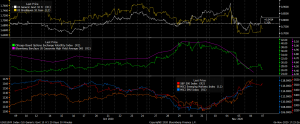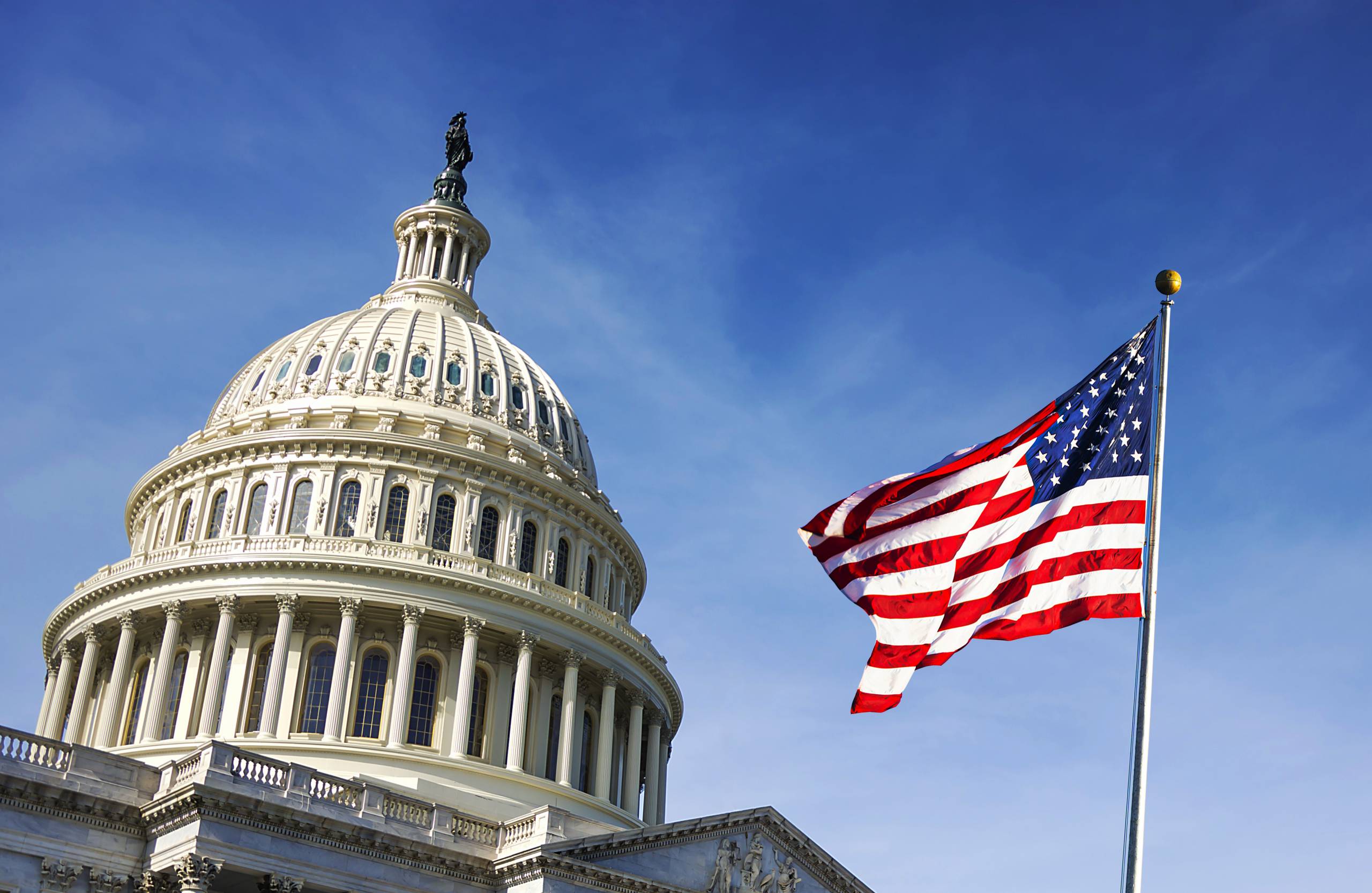After five days of slow counts, unfounded accusations of voter fraud and a number of close calls, Joe Biden has beaten Donald Trump in the US presidential race. Flipping key states like Pennsylvania and Michigan, Biden took well over the 270 electoral college votes needed to win, putting an end to one of the most tumultuous presidencies in modern times.
The result was met with positivity from the stock exchanges. Within hours of the stock market closing, US equities (the red and blue lines in the chart below) rose ~7% across the week, driven mainly by growth stocks. The rally also extended to Europe (~8%) and Emerging Countries (~4%).
An injection of calm
Even when it looked like the election result might be contested by Trump, the market reaction was positive. Focusing more on the medium term, markets showed that they never wholly took the president’s rhetoric seriously.
The VIX (green line in the graph below) – an indicator of fear in US markets – fell by 30%, returning to pre-election levels. Not even Trump’s repeated accusations of fraud have reversed the trend. We shouldn’t forget that this election has been a major risk factor over the past few weeks – its orderly conclusion has been welcomed.
The movement of the rates curve was predictable given the reduced likelihood of a big fiscal stimulus. A drop of more than 20 bps on long-term maturities (yellow and white lines in the graph below) was catalysed by a reduction in inflationary expectations. We recall how an interest rate regime contained in the context of a growing economy is a determining factor for corporate valuations.

Credit: Bloomberg
The ‘Blue Wave’ never came
Despite losing the race, the Republicans performed better than perhaps any pollster predicted. Where most predicted a loss in the White House, the Senate and the House, this kind of sweeping Democrat triumph now seems unlikely. Any anxiety about increased taxation on larger companies has, for now, been assuaged.
With election uncertainty largely behind us, markets will now turn to focus on the issue of economic recovery. We don’t rule out the possibility of Biden’s proposed tax reforms sparking volatility, but the fact that the Democrats likely won’t hold a Senate majority could mean a better balance between investment and taxes. This could take some of the pressure off of equities.
Time for fiscal stimulus
On the other hand, a divided Congress could hinder the political process towards a new stimulus package. This goes some way to explaining the underperformance of cyclical sectors and mid-cap companies, which are in greater need of state support. However, it seems unlikely that party politics will significantly limit the scope and scale of fiscal action.
There is, historically, no evidence that a divided Congress negatively affects market performance. Having said that, we need to see rapid progress in fiscal stimulus talks and economic manoeuvring talks to justify the current equity valuations.
A note on bonds
Now, let’s have a quick look at bonds. As mentioned, the yield curve has, initially, flattened. This is likely a response to the Democrats’ seeming failure to win a decisive victory. This isn’t to say that, when the details of the Democrats’ economic plan are clearer, an increase in prices won’t rekindle and the curve won’t rise again in relation to long-term rates.
A new approach to Covid-19
One of the more immediate impacts of the Biden presidency will come from his ‘Covid-19 task force’. Tasked with essentially ripping up Trump’s response to the pandemic and starting anew, the advisory team will be key to Biden’s plan to get the US’ sky-high infection figures down.
Biden was quick to discuss Covid-19 in economic terms during his victory speech in Delaware on Saturday night. “We cannot repair the economy, restore our vitality, or relish life’s most precious moments,” Biden said, before getting the virus under control. Those with their priorities rooted in economics and a sharp ear will take kindly to the ordering.
Ultimately, Trump’s disastrous Covid-19 response – he has overseen more cases and deaths than in any nation globally – played a significant role in his election failure. The global economy, impacted as it is by the continued spread of the pandemic, will have one eye on Biden’s fresh approach to the virus, a change of direction that could be a boon in the medium to long term.
One less risk factor for 2021
In short, it seems that what the markets feared most was uncertainty itself. All in all, as we move closer to 2021, we see macroeconomic factors taking precedence over political issues. This could be good for risky assets, so long as growth starts picking up momentum in the first quarter and Covid-19 doesn’t spiral out of control again.
Of course, any appeals process could throw a spanner in the works, with lawyers tasked with looking for irregularities even before the result was confirmed. Trump contested the legitimacy of mail-in votes, which has been met with bemusement more than concern from a Democrat perspective.
An extended saga of controversy akin to that seen in 2000 now seems unlikely, though, given Biden’s resounding electoral college win. It may have been slow, tense and occasionally ugly, but the democratic process was conclusive enough to realistically rule out any legal challenge.





